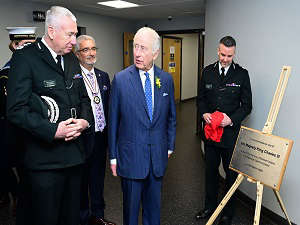
By Q Radio News and PA Reporter
A long-running and controversy-dogged plan to redevelop Casement Park gaelic games stadium in Belfast has been recommended for approval.
Stormont infrastructure minister Nichola Mallon announced her decision on the planning application on Tuesday morning.
Today I have announced that I am recommending Casement for approval. I believe this landmark stadium will be transformational in sporting, social & economic terms for Ulster & our island. pic.twitter.com/OCkWBgbav8
— Nichola Mallon (@NicholaMallon) October 13, 2020
The GAA’s efforts to develop the old stadium site have been mired in contention, with initial planning approval for a 38,000-capacity venue quashed by the High Court in 2014 following a challenge by nearby residents.
A Stormont inquiry followed after a safety expert raised concerns about emergency evacuation plans in the initial design. The GAA insisted it acted appropriately throughout the first design process.
A revised plan for a scaled back 34,000-plus capacity stadium was then submitted by the GAA. The build is anticipated to cost around £60 million.
Despite the reduced size, the plan continued to face vocal opposition from some residents living around the venue.
Other residents however were supportive of the plan to revive and regenerate the currently overgrown and crumbling stadium site.
Ms Mallon said the redevelopment would see the derelict facility turned into a “landmark” stadium.
More than ten years since the Casement Park project was announced and more than seven years since Antrim Gaels had a home. We finally have a planning decision over the line. Great result 👏👏👏
— Michelle O’Neill (@moneillsf) October 13, 2020
“Today marks a significant step in the redevelopment of Casement Park,” she said.
“The Ulster Council of the GAA can now move forward with their ambitious plans for the regeneration of the stadium.
“Since taking office I have stressed the need for progression of this long-awaited application. I acknowledge that this approval was not an easy decision, there has been an extensive consultation process due to the complexities of the application and the level of public representation in relation to the proposal.
“I recognise the impacts on residential amenity from the proposed development but ultimately I had to weigh such impacts with the social and economic benefits that would result from the completion of this project and I truly believe that the Casement Park stadium will be successful.
“The new stadium is of high quality design and will become a renowned landmark building which will provide a further catalyst for regeneration of the Andersonstown Road and an economic boost to west Belfast in general. Belfast as a whole shall benefit from this redevelopment, connecting people from across the city, the north and further afield.
“This stadium will boost sports tourism and the economy in the north. Jobs during the construction phase and additional jobs for the daily management are to be welcomed.
“This decision represents a significant boost for our economy, our community and sports across Ulster and across our island.”
Ulster GAA described the announcement as “hugely positive news”.
The local west Belfast MP, Paul Maskey spoke to Q Radio and gave his reaction to the news:
Delighted that Casement Park planning has been approved. This is a great day for Gaels, west Belfast & beyond.
— Paul Maskey (@PaulMaskeyMP) October 13, 2020
Long over due but the decision has been reached. Well done @UlsterGAA @AontroimGAA & everyone involved.
Many meetings done over the years but glad we stuck at it. pic.twitter.com/pzyyYFwZZk
A Notice of Opinion to approve will now be issued to Belfast City Council and Ulster GAA. If both bodies agree with the decision, all relevant parties will then work to finalise a planning agreement on how to proceed with the rebuild. Once that is concluded, Ms Mallon will issue final planning approval.
Ms Mallon’s decision comes after a recent law change clarified her powers.
The Executive Committee (Functions) Act enabled her to act without resource to executive colleagues.
The law was changed in response to a court decision over the Arc21 incinerator project.
The 2018 court judgment had placed a question mark over the infrastructure minister’s powers to take significant planning decisions without the approval of the wider executive.
The new law clarified what constitutes a cross-cutting decision, amid concerns that the judgment set a precedent that any issue involving more than one minister should be referred to the executive.
First Minister and DUP leader Arlene Foster faced some internal unrest over the Bill, amid concerns it could pave the way for more ministerial solo-runs.
Despite the dissenting voices in her party, Mrs Foster still managed to secure the necessary backing to fast-track the Bill through the Assembly.


 King and Queen test their baking skills during Northern Ireland visit
King and Queen test their baking skills during Northern Ireland visit
 Teachers offered 5.5% pay rise in ‘enhanced package’
Teachers offered 5.5% pay rise in ‘enhanced package’
 Belfast named UK’s biggest pub music scene outside London
Belfast named UK’s biggest pub music scene outside London
 King and Queen meet creatives during visit to heart of Belfast
King and Queen meet creatives during visit to heart of Belfast
 Man, 18, remanded in custody charged with attempted murder in Belfast
Man, 18, remanded in custody charged with attempted murder in Belfast